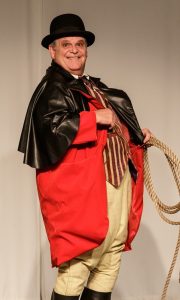Why Wait? fruitlessmoon Does Justice to Beckett’s Watershed

If you think Lucky (Don Loper) has it bad, wait’ll you see what’s in store for Vladimir and Estragon. PHOTOS BY JIM CARMODY
But mispronounce and misinterpret we do, even as this monumental work has been performed thousands of times from the U.S. to India since its Paris debut in 1953. Our persistent gaffes are no small things, either. If nothing else happens in this play, the demand for exacting language and phonics certainly does. Out of question, it’s the driving force behind the two central characters’ search for a guy they barely know and probably wouldn’t recognize.
fruitlessmoon theatreworks artistic director Aimee Greenberg deftly takes this into account, serving up a handsome, artful and funny treatise on man’s insignificance in the scheme of things and the absurdity behind the phenomenon of hope. And well she should. Her San Diego-based company is getting its feet generously wet amid her studies with the likes of Stella Adler and Sanford Meisner and a production pedigree from the U.S., Europe and Asia.
Vladimir and Estragon, a pair of itinerants who’ve tramped about the universe for the last 50 years that they know of, park themselves at a roadside every day, awaiting the arrival of a man named Godot. He’s supposed to show up today, they surmise, and they camp next to a skeleton of the tree that marks the spot. Like Estragon’s shabby boots, Godot is a euphemism for the remedie du jour, the person or thing or place designed to resurrect purpose amid a lifetime of slings and arrows.
Godot, of course, never shows up, fueling Vladimir and Estragon’s pledge to commit suicide by hanging the next day, the culmination of their fruitless search for life’s meaning. “Everything oozes,” Estragon laments — “it’s never the same pus from one second to the next.”
For Beckett, life’s only certainty was uncertainty — and beautiful language like that is his declarative tool, culled at once from the nonsensical, the cadenced, the coherent and indeed all three. “One of the thieves was saved,” Vladimir says in a fit of perspective, adding that “it’s a reasonable percentage”; “My left lung is very weak,” Estragon shouts to no one in particular, “but my right lung is sound as a bell”; “[Man,] in spite of the strides of alimentation and defecation,” sizzes itinerant Lucky, “is seen to waste and pine, waste and pine, and concurrently, simultaneously, what is more, for reasons unknown… The skull, the skull, the skull in Conemara, in spite of the tennis… !”: The exhaustive legato is unmistakably Beckett, and all those big fat vowels tap every referent in our ears, fueling our trust in the writer.

Vladimir (Tom Steward, left) looks forlorn amid Godot’s absence; Estragon (Joe Powers) just looks tired.
The performances aren’t nearly so baffling. Greenberg has her cast braying, bellowing and screeching at every opening, their superstylized overwroughtness underscoring the nutty language. Fred Harlow’s Pozzo is a master manipulator, whose cowardice becomes apparent in a pivotal moment of weakness. Lucky is indeed fortunate to have been spared Vladimir’s and Estragon’s weighty questions about existence, and Don Loper plays him accordingly. Jodi Bertran’s Young Boy announces Godot’s nonappearances in the best traditions of an appointed messenger. And Tom Steward’s and Joe Powers’ Vladimir and Estragon are peas in a pod (or not), with Vladimir’s contentiousness the foil to Estragon’s fatigue. Their boot and bowler-swap scenes are priceless (all the players wear bowlers, which is the only stage direction Beckett gives in the script).
I wouldn’t put it past Sam, in fact, to have conceived of Vladimir and Estragon as the same person — one mind, one spirit and one identity crammed into two bodies. Time, after all, has ceased in their world; couldn’t separate physicalities have lost universal favor as well? This play lets you think about stuff like that amid Tom Call’s minimalist set, Verl Averett’s one-note technical direction (I mean “one-note” in a good way) and Carol Whaley and Lisa Burgess’ otherworldly tawdry costumes (dig the ghastly number Whaley does on Lucky’s makeup!).

Pozzo (Fred Harlow) confirms Vladimir’s and Estragon’s worst fears.
This review is based on the production of March 26. Waiting for Godot runs through April 10 at White Box Live Arts, 2590 Truxtun Road at NTC Liberty Station in Point Loma. $22.00-$27.37. fruitlessmoontheatreworks.org, 949-246-1698, or godot.eventbrite.com.

Great review Marty! Certainly got me re-interested in the play and in this production! You’re a master of intelligent critique!